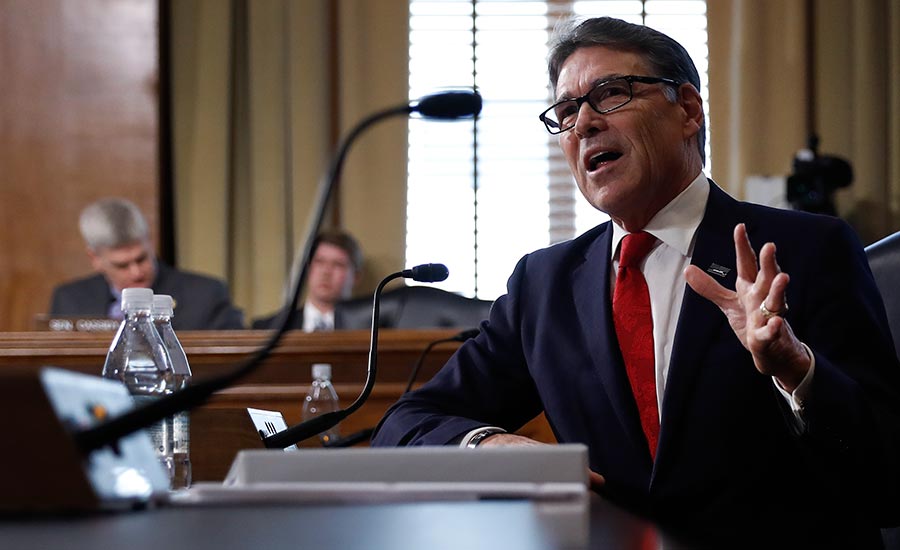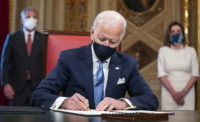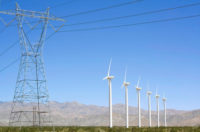On the eve of Donald Trump's inauguration, Democrats on Senate confirmation committees grilled his nominees to head the U.S. Energy Dept and U.S. Environmental Protection Agency, ready to challenge earlier statements and new reports of the incoming administration's intention to eviscerate the agencies.
Energy Committee Democrats on Jan. 18 pressed former Texas Gov. Rick Perry at his hearing to be Energy Secretary on reported DOE budget cuts proposed by Trump’s transition team.
The Hill publication, which reports on Congressional activity, on Jan. 18 reported the transition team’s proposals to eliminate the offices of electricity, fossil energy, efficiency and renewable energy and to roll back funding to 2008 levels for nuclear physics and advanced scientific computing research.
Sen. Angus King (I-Maine) said he finds it almost a parody to be cutting energy research at this time. “The cuts proposed are devastating. Technology is the way forward,” he said.
Perry said he was not sure the press reports were true and said he would work to protect the agency’s budget.
Perry vowed to protect and modernize the country’s nuclear stockpile and protect the electric grid with enhanced cybersecurity and advance the agency’s critical science and technical missions. “I will protect energy in all forms including renewables,” he said.
He also said he supports the cleanup of nuclear waste, including the Hanford former nuclear production site in Washington, which he called a daunting task.
Perry expressed his regret over his previous view that DOE should be abolished, saying it does not reflect his current thinking.
Democrats pushed back against Perry’s view that climate change should be addressed in a thoughtful way without compromising jobs. “I’m committed to decisions on sound science and economic impacts,” he said.
He also touted his success as Texas governor at bringing down greenhouse gas emissions and the state’s closing of coal plants, while moving to clean coal technologies such as carbon capture. Texas also took the lead in developing wind energy during his tenure, he said.
Senators Al Franken (D-Minn) and Maria Cantwell (D-Wash.) took issue with Perry’s decision to weigh climate change with economic growth. "We have economic impacts from the use of fossil fuels," she said, and referred to a report coming out later this year that will show the costs will be “higher than billions.”
When asked about the questionnaire the Trump transition team sent to DOE staffers about their involvement in climate change actions and issues, Perry said he didn’t need it and didn’t want it. “That’s not how I manage,” he said.
He would not commit to supporting national renewable energy standards as a means to give the private sector the confidence to invest in renewable energy. He prefers to leave that decision up to states.
Perry also said that if Trump is successful in bringing manufacturing jobs back to the US from China, it would have more effect on greenhouse gas emissions than any other effort.
Senator Martin Heinrich (D-N.M.), asked Perry if he would commit to using science as his guide at DOE. Perry responded that his record shows that he uses data and sound science to make decisions. But he also said it is important to keep in mind that science isn’t always right.
Senator Joe Manchin (D-W.Va.) worried that DOE’s $2.9-billion budget to support renewable energy research is not rational and asked Perry for a better mix of spending on fossil fuels and nuclear research. “Don’t get me confused with the previous administration,” Perry said. He will promote those sources of energy that drive the economy and protect the environment, he said.
Republicans pushed Perry to commit to suspending barters and transfers of excess uranium and to increase permitting for liquefied natural gas exports. Sen. King told Perry that increasing exports of natural gas too much would dramatically affect domestic prices. LNG permit approvals have to be in the public interest, he said. Perry said he would follow the law on the transfers of uranium.
On Jan. 18, Democrats on the Senate Environment and Public Works Committee pushed hard against Trump nominee for EPA Administrator Scott Pruitt, who warned against the “false narrative” that being pro-energy is the same as being anti-environment.
Pruitt, Oklahoma’s attorney general, said the rule of law matters and it is not the job of the agency to pick winners or losers against any segment of the economy. Senators, however, gave examples of Pruitt’s siding with industry over the health and safety of the state’s citizens in the 14 lawsuits his office has filed against the agency.
Senator Corey Booker (D-NJ) said Pruitt had taken a letter from an oil-and-gas company and sent it to EPA under his own letterhead. Booker asked how many letters he has written on his letterhead on behalf of the 111,000 children in Oklahoma that suffer from asthma, noting that cross-state air pollution has caused injury to the citizens of Oklahoma. “You call that representative government?” Booker said.
Pruitt said his actions as attorney general represent the interest of the people of Oklahoma.
Booker also challenged Pruitt on his claim to have reached an historic agreement to reduce phosphorus levels in the Illinois River. “You attempted to suspend compliance,” Booker said, also saying that the poultry industry approved of his actions.
When challenged on his view of the Mercury and Air Toxics Standards, considering the three lawsuits Pruitt is a party to against the rule, the attorney general said he agreed that mercury is dangerous and should be regulated. He voiced concern that there was no cost-benefit analysis done when establishing the rule.
Sen. Sheldon Whitehouse (D-R.I.) pressed Pruitt on the contributions to his campaigns from the oil and gas industry and his role as a board member and chairman of the Rule of Law Defense Fund, which supports Republican state attorneys general and raises money from that industry. Pruitt had not disclosed his involvement with the defense fund to EPA ethics officials, Whitehouse said.
On the day that federal agencies NOAA and NASA said that 2016 was the warmest year on record, Pruitt, who has the reputation of a climate denier, said he does not believe that climate change is a hoax as Trump has claimed.
Pruitt agreed that human activity has affected the climate, but the ability to measure that effect with precision is subject to continued debate and dialogue.
Sen. Bernie Sanders (I-Vt.) reeled when Pruitt said his personal opinion on the subject was “immaterial.” Sanders reminded him that the job of the EPA administrator is to protect the environment. Pruitt has been active in 27 lawsuits against the Clean Power Plan meant to reduce pollutants that affect the environment.
Sen. Jeff Merkley (D-Ore.) pressed Pruitt, asking him if he sees action on climate change as a legal obligation or urgent because of its effect on the next generation. “I feel like you don’t understand the gravity of the situation,” Merkley said.
But Pruitt blamed EPA's delay in taking action for the problems in Flint, Mich., with lead in drinking water. “It should have had a more rapid response,” he said. Sen Tammy Duckworth (D-Ill.) countered that she was “flabbergasted” when Pruitt said he had not looked into the scientific research regarding lead levels in drinking water.
While Pruitt said he was concerned about methane toxicity, he would not agree that he was “highly concerned” when the issue was raised by Merkley, who accused Pruitt of using his office as a “direct extension” of an oil company rather than as protector of the public health. “Can you provide evidence that you consulted others?” Merkley said. Pruitt said he was concerned by overestimates by EPA of methane’s toxicity.
Pruitt said in response to concerns from Republican senators from farming states that EPA would provide certainty to those who are regulated by the Waters of the US rule.
Sen. Edward Markey (D-Mass) asked Pruitt if he would recuse himself from regulatory decisions involving the 14 cases he has filed against EPA. Pruitt responded that he would do so if asked by the EPA’s ethics counsel. “What the American people are expecting here is that the EPA doesn’t turn into every polluter’s ally,” Markey said.
Pruitt testified that he is concerned about the overreach of EPA to end-run around Congress to make rules by the use of regulation through litigation. He also said his intent is to advocate for the primary responsibility of states in enforcing environmental rules.
Sen. James Inhofe {R-Oklahoma) introduced Pruitt as a champion of state and individual rights.





